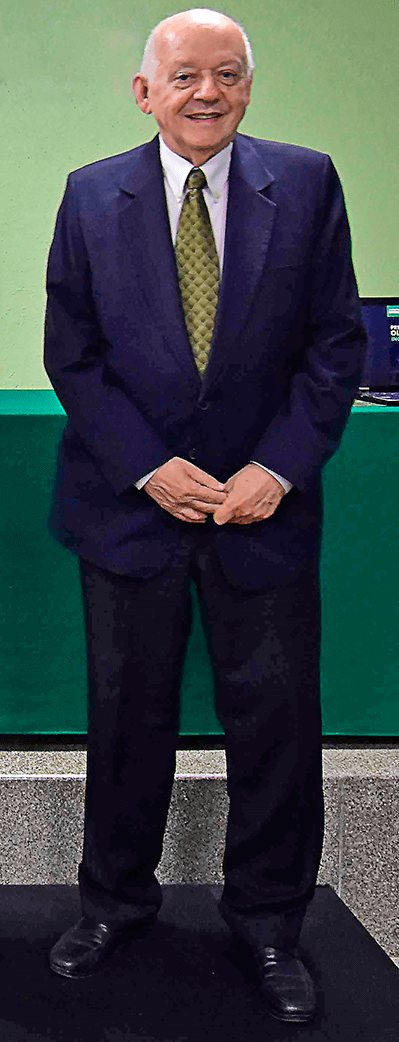
OSCAR SERRATE: "Renewables Not Expected to Meet the Entire PLANETARY ENERGY DEMAND"
Vesna Marinkovic U.
Highlighting the importance of fossil fuels in energy demand, he acknowledges that the transition is necessary, but questions whether we will be able to manage it while minimizing human, financial, and material costs...
1Some universities in the United States and Europe have stopped investing in fossil fuels and are strongly promoting renewables. What is your opinion on this?
It can be observed that companies, organizations, researchers, and many stakeholders are indeed investing resources, knowledge, and technology to further expand the renewable component of energy. I see this as a positive and encouraging trend, particularly challenging for universities, as they are always called upon to expand science and technology to solve problems that constantly renew in the real world.
Óscar Serrate Cuéllar, one of the Bolivians with the most outstanding international trajectory in the field of Engineering and institutional, is the new Dean of the Faculty of Engineering (FI) at the Private University of Santa Cruz de la Sierra (UPSA) since 2022. He holds a Ph.D. in Engineering from the Catholic University of Louvain (Belgium). He is also a Master of Systems Engineering and a Bachelor of Electronic Engineering from the University of San Pablo. He also has a Diploma in Economics from the University of Paris (France) and a postgraduate degree in engineering management studies.
2• Cambridge and Oxford in Europe have faced strong pressures, even from students, to eliminate majors like Petroleum Engineering. This leads to thinking about whether renewables can indeed meet the entire global energy demand...
Every physical, chemical, or industrial transformation involves waste. It is inherent in human productive activity. Each technological leap has led to process changes with their own byproducts. The industry and transportation generated carbon dioxide that eventually caused climate changes. Renewables, too, will leave their footprint at some point, although it may cushion the impact of hydrocarbons. Some analysts believe that the shift in the energy matrix would require vast territories to accommodate enough solar panels or wind turbines. In other words, it is not expected that renewables alone can meet the entire planetary energy demand.
Driven by advances in supercomputing and machine learning, the industry has managed to train large artificial intelligence models that can perform a wide variety of tasks using natural language, from summarizing and generating text to creating photorealistic images and writing sophisticated computer code. These models are already assisting in tasks such as content synthesis, document management, and sales flow optimization and could eventually extend even to areas like designing new molecules for drugs or creating manufacturing recipes for 3D models.
3This trend of disinvestment in fossil fuels is affecting companies and countries engaged in fossil fuel exploitation and production worldwide. Is it a trend, a crisis, or a strategic transition?
It is a necessary transition, although companies and countries are driving it differently. The real question is whether we will be able to manage it while minimizing human, financial, and material costs. The big losers, so far, are the poor countries that lack managerial, economic, and international contextual capabilities.
Globalization of energy is not recent, but now we have reached higher levels of dependence on global market variations and are driven by external currents that limit the rapid changes that technology requires. That is why now is when we need to research and educate professionals the most, because the less gas we sell, the more human energy we will need. Of all types. And at all times and places. Energy is always the result of internal consensus.

"Money usually becomes scarcer due to a lack of legal or return guarantees rather than the type of energy."

4Some oil companies have stated that, in this situation, even international organizations refuse to finance oil exploration projects. Is this situation harming hydrocarbon-producing countries like Bolivia, for example?
In the world of finance, the logic of money almost always prevails. And money always requires two minimum aspects: security and profitability. There are no financial mechanisms if the investment is risky, technically, socially, and/or legally. Money usually becomes scarcer due to a lack of legal or return guarantees rather than the type of energy.
5Is all this situation influencing the universities in the country? UPSA in any particular way?
I am a witness that UPSA always responds positively. Every day, educators must continue to have faith in the future being built for future generations, who increasingly adopt the logic of Sustainable Development, whose ethics precisely aim to reconcile the rights of the present with those of the future. Young people are learning that every problem, big or small, can be solved. They know that the dilemmas we face have answers and that reality is not waited for; it is constructed. In that sense, UPSA is a school of life, a school of leaders who know how to deal simultaneously with the challenges of new technologies and the old and persistent poverty.
6After this, can academia "per se" contribute to building a less environmentally complex world?
The modern trend is to promote cooperation networks that integrate alliances between Companies, Society, State, and Academies. Each actor with its role and with a common goal: to achieve the rapid pace of science and not be anchored by internal dissent.
7At the moment, UPSA has also decided to invest in Mechatronics Engineering. Are there good prospects?
We affectionately call Mechatronics and Robotics ME-RO at UPSA. We launched this program, which is our new major contribution, precisely when UPSA celebrates 40 years of service to the community and the country.
UPSA has already graduated 10,500 professionals in local, national, and international businesses and initiatives. Now we are going to strengthen our role in the current technological forefront with very good prospects.











